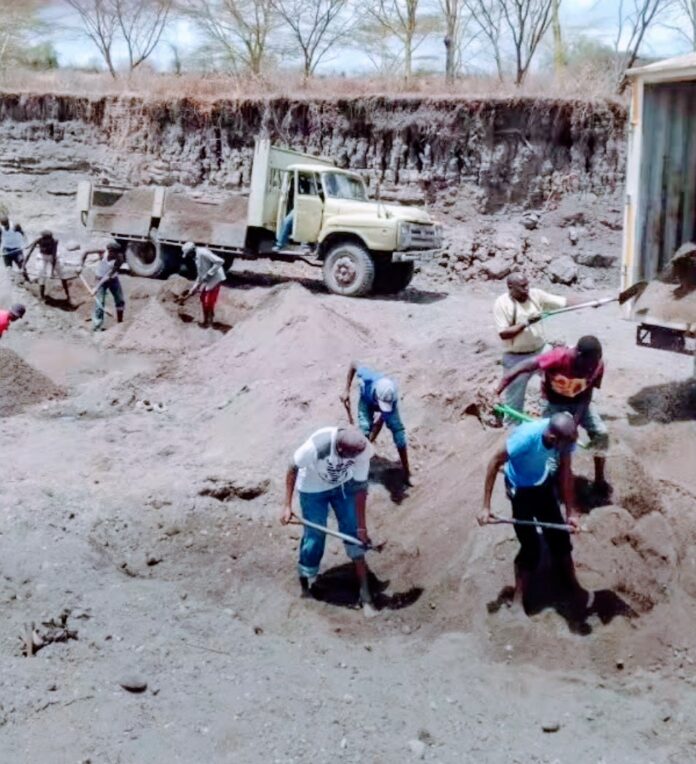By Christine Wangoi, DevReporter, Kajiado County

Quick facts about sand harvesting in Kajiado
- Sand harvesting is done along river beds
- The lucrative trade is unregulated.
- Only males participate as loaders.
- Lorries fetching sand pay Cess to the county government.
- Teen boys freely participate as loaders
- Sand harvesting happens both day and night
Rampant sand harvesting along riverbeds in Kajiado County has largely contributed to the rate of dropouts among schoolboys. Education stakeholders agree that this rate is alarming, threatens education and hence, they are calling for urgent interventions. The Stakeholders say that the unregulated business of scooping and selling sand, has also promoted drug and substance abuse among teenage boys who work as loaders.
The allure of quick cash, lack of sand harvesting regulations, peer influence and the ignorance/arrogance of guardians, further hamper the fight against illiteracy in the county.
“Sand harvesting among boys is a worrying trend. It has hit the education sector hard. Teenage boys are ending up semi-illiterate. Some students go to school during the day and work as sand loaders at night. The practice has largely affected their performance. It has also affected their discipline. We also have cases of drug abuse,” says Elly Korinko, the Secretary of Rift Valley Chapter of the Kenya National Union of Teachers.
The education stakeholders further contend that efforts to combat drop out rates among schoolboys due to sand harvesting, have been an uphill task due for various reasons. These include:
- Arrogance
- Lack of cooperation by parents
- Rogue administration officers
- Lack of sand regulation policy
- Counter blame games
Arrogance
Some parents deliberately breach article 53 of the Kenya 2010 constitution which states that every child has a right to be protected from abuse, neglect and exploitative labor.
Joyce Munke, a resident of Mashuuru and a mother of three boys and four girls, is among those parents who admit to ignoring the law
“My boys work as sand loaders. I know it is against the law, but I have no option. When the law catches up with me, I will handle it from that point. For now my children have to eat and since I have no school fees, they better work instead of staying idle and hungry at home,” said Joyce Munke.
Lack of Parent’s Cooperation
Some parents lie for their teenage boys and assist them in acquiring identity cards while underage.
“Our children learn so that they can manage their lives. The sand is God-sent and helps us manage our lives. We lost our main source of livelihood to drought. Now we cannot afford school fees and our children have an alternative to work for a living,” argued Joseph Kirioki, a resident of KMQ village, Kajiado West.
Rogue Administration officers
Some rogue chiefs have been profiled as among those promoting child labor by failing to report such cases. Some are accused of being accomplices by aiding boys who lie about their age to acquire identity cards.
Lack of Sand Regulation Policy
Kajiado County has from time-to-time faced setbacks in trying to formulate its Sand Regulation Policy.
In July 2024, after facing a major resistance from traders, loaders and locals, the County assembly was forced to recall a bill meant to control sand-river harvesting. Banning night sand harvesting was among the proposed stringent measures that had been captured in the Sand Conservation and Quarrying Management Bill, 2024.
Counter Blame Games
The counter-accusations on who was responsible for the protection of under-age children from engaging in sand harvesting, has been identified as among the issues that fuel the trade. Parents blame poverty, government agencies blame parents; terming them irresponsible, while others blame environmental agencies for allowing uncontrolled sand harvesting to continue.
Interventions
Sponsoring needy boys to rejoin school and offering free vocational training for those who have attained the age of 16 years, are among measures that the stakeholders have been putting in place. Reporting parents who allow their children to engage in sand harvesting is also a measure taken by the education champions.
Valeria Mabeya, the Coordinator, office of Kajiado Children coordination, says that beyond sand harvesting, teenage boys in urban centres are engaging in agricultural and market activities, herding, cart-pushing and boda-boda operations. This is illegal and at the expense of the teenagers’ education.
“We are delighted that when some needy parents are supported through sponsoring their son’s education, they embrace the help and let the boys go back to school. We have others boys who are supported by well-wishers to join vocational training, and this removes them completely out of the child labor market. We are holding more sensitisation sessions among community members to help them understand the negative implications of child labor. We are also pursuing a multi-sectoral approach in fighting the menace. We also believe that putting in place a Children’s Act that is aligned to the County policy, will also be crucial in addressing the challenge. We are at advanced stages of formulating the policy and this will enable us to address pertinent issues and gaps comprehensively,” says Mabeya.
Section 127 of the Children’s act, 2022, recognizes that every child has a right to compulsory education, and even goes further to spell out the penalty for cruelty to, and neglect of children.
A 2021 report by the Kenya National Bureau of Statistics (KNBS), indicated that 8.5 percent of children, equivalent to 1.3 million, had engaged in child labor.
To reduce these alarming numbers, there is a need for all concerned stakeholders to put measures in place towards the attainment of requisite levels of education and training, so as to support the creation of a fair and democratic society as spelt in Kenya Vision 2030 social pillar.




